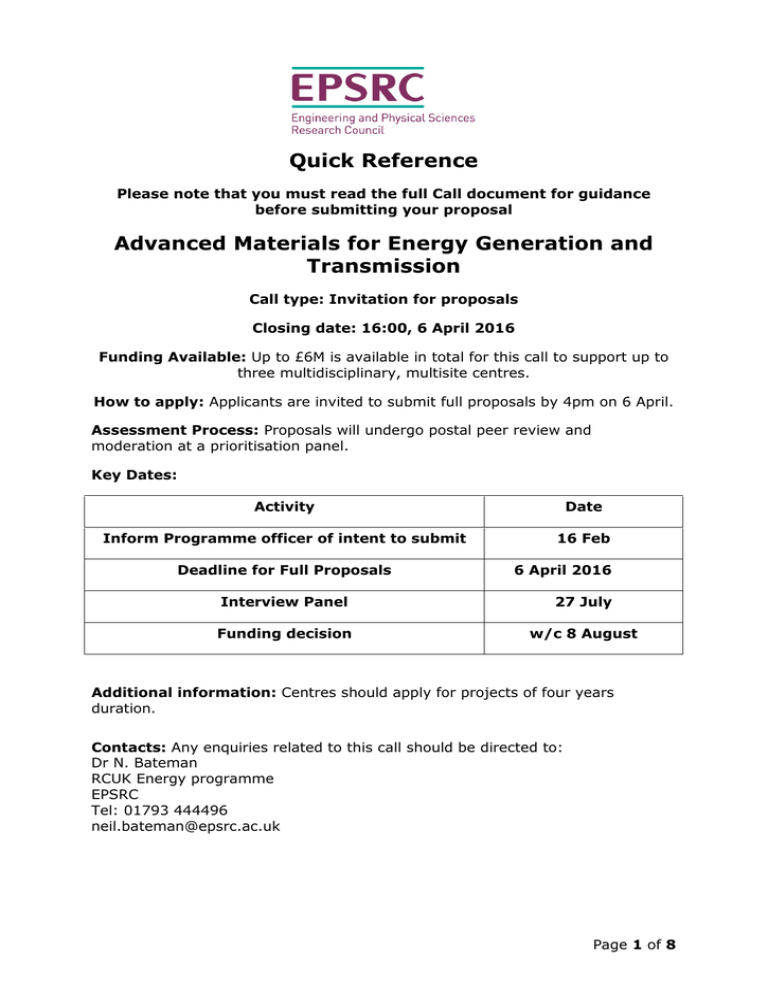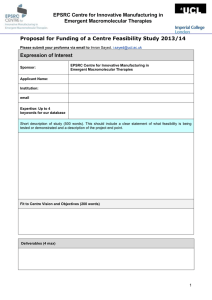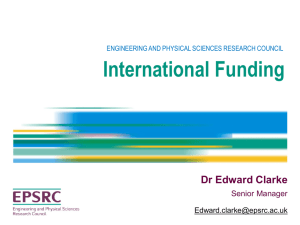Advanced Materials for Energy Generation and Transmission
advertisement

Quick Reference Please note that you must read the full Call document for guidance before submitting your proposal Advanced Materials for Energy Generation and Transmission Call type: Invitation for proposals Closing date: 16:00, 6 April 2016 Funding Available: Up to £6M is available in total for this call to support up to three multidisciplinary, multisite centres. How to apply: Applicants are invited to submit full proposals by 4pm on 6 April. Assessment Process: Proposals will undergo postal peer review and moderation at a prioritisation panel. Key Dates: Activity Date Inform Programme officer of intent to submit 16 Feb Deadline for Full Proposals 6 April 2016 Interview Panel 27 July Funding decision w/c 8 August Additional information: Centres should apply for projects of four years duration. Contacts: Any enquiries related to this call should be directed to: Dr N. Bateman RCUK Energy programme EPSRC Tel: 01793 444496 neil.bateman@epsrc.ac.uk Page 1 of 8 Advanced Materials for Energy Generation and Transmission Call type: Invitation for proposals Closing date: 16:00, 6 April Related themes: Engineering, Manufacturing the future, Physical sciences Summary This call is for applications for proposals to set up virtual research centres for energy materials. There is up to £6M in total available to support up to three multi-institutional and multi-disciplinary centres. The successful centres will be required to work together forming a national network of energy materials research groups with the intent of forming a coherent UK community of energy materials researchers. The prioritisation panel will be asked to support centres that will be focussing on different areas. This call is open to all who are normally eligible to apply for EPSRC grants. Further eligibility information is given later in this document. Applications should show that the proposed centre has a breadth of materials research capability, that the applicants have capability in multiple energy technology areas, and that they are keen to engage with other energy materials research groups in the UK. Research programmes that are described in the application should be multidisciplinary and interdisciplinary, seeking to link theoretical and applied research, focussing on real word problems. Applications should address multiple research ‘themes’, examples of which are given below. Suggested research ‘themes’ • Materials modelling and characterisation. • Structural and coating materials. • Materials for hazardous environments in energy applications. • Multifunctional materials for energy applications. • Materials for energy conversion and storage. • Smart materials for energy applications. Please note that these examples are for illustrative purposes only. Applications should include support for networking as well as a defined programme of research. The successful centres will be asked to create and contribute to a national ‘materials for energy network’ that includes all the successful centres as well as groups outside the centres. Flexible funding to support emerging research areas may be included but should be a minor part of the proposal, and a robust system for allocating the flexible funding to research activities must be described in the case for support. Page 2 of 8 There is no outline stage to this call; full proposals should be submitted by 16:00 on the 6 April 2016. However, applicants are asked to send an email to the programme contact given at the end of this document indicating their intent to submit a proposal. This email should include the names of the PI and CoIs, the institutions involved and the approximate research areas that are involved. Please note that this is for our information only and is not intended to constrain the eventual full application. Background The purpose of this call is to underpin recognised centres of energy materials research, to encourage those centres to link with new research groups working in complementary areas and to link centres into a coordinated national network. In recent years there have been several targeted calls for materials research, both generic and focussed, that have begun to underpin the energy materials research effort in the UK. At the same time advanced materials have been highlighted as a critical technology and named as one of the eight great technologies that are of national importance. The importance of advanced materials has been underscored by the setting up of the Advanced Materials Leadership Council (AMLC) in Dec 2014 to provide strategic advice and strong leadership to enable accelerated development of advanced materials applications for the benefit of the UK. The AMLC highlights advanced materials for energy applications as one of the critical materials technology applications. The ultimate aim is to create a strengthened energy materials research community that covers the full breadth of energy research areas and that is strongly linked both nationally and internationally. For more information about EPSRC’s portfolio and strategies, see our website: https://www.epsrc.ac.uk/research/ourportfolio/. Funding available Up to £6M is available in total for this call to support up to three multidisciplinary, multisite centres. Centres should apply for projects of four years duration. Equipment Where possible, researchers are asked to make use of existing facilities and equipment, including those hosted at other universities. If equipment is needed as part of the research proposal, applicants must follow EPSRC’s rules for requesting equipment over £10,000 in value. Individual items of equipment up to the current OJEC (Official Journal of the European Communities) procurement threshold can be included on research proposals submitted through this call, but research organisations will be expected to make a 50% contribution to the cost. For more information on equipment funding, please see: https://www.epsrc.ac.uk/research/facilities/equipment/ The current OJEC threshold can be found at: https://www.epsrc.ac.uk/research/facilities/equipment/process/” Page 3 of 8 Eligibility For information on the eligibility of organisations and individuals to receive EPSRC funding, see the EPSRC Funding Guide: https://www.epsrc.ac.uk/funding/howtoapply/fundingguide/. As this call is a targeted funding opportunity provided by EPSRC, higher education institutions, and some research council institutes and independent research organisations are eligible to apply. A list of eligible organisations to apply to EPSRC is provided at: http://www.rcuk.ac.uk/funding/eligibilityforrcs/. How to apply Submitting an application You should prepare and submit your proposal using the Research Councils’ Joint electronic Submission (Je-S) System (https://je-s.rcuk.ac.uk/). When adding a new proposal, you should select: • Council ‘EPSRC’ • Document type ‘Standard Proposal’ • Scheme ‘Standard’ • On the Project Details page you should select the ‘Materials for Energy Technology’ call. Note that clicking ‘submit document’ on your proposal form in Je-S initially submits the proposal to your host organisation’s administration, not to EPSRC. Please allow sufficient time for your organisation’s submission process between submitting your proposal to them and the call closing date. EPSRC must receive your application by 16:00 on the 6 April 2016. Guidance on the types of support that may be sought and advice on the completion of the research proposal forms are given on the EPSRC website (https://www.epsrc.ac.uk/funding/howtoapply/) which should be consulted when preparing all proposals. Guidance on writing an application Please note that on submission to EPSRC all non-PDF documents uploaded onto Je-S are converted to PDF, the use of non-standard fonts may result in errors or font conversion, which could affect the overall length of the document. In addition, where non-standard fonts are present, and even though the converted PDF document may look unaffected in the Je-S System, when it is imported into the Research Councils Grants System some information may be removed. We therefore recommend that where a document contains any nonstandard fonts (scientific notation, diagrams etc), the document is converted to PDF prior to attaching it to the proposal. Page 4 of 8 Please note that the case for support has a page limit of eight rather that the normal six pages, otherwise, standard proposal criteria apply. Applications must include; • Case for support, including track record of applicants (two sides A4) and description of proposed research (up to eight sides A4). Please note that a National Importance Statement must be included in the case for support, for guidance on writing national importance see; http://www.epsrc.ac.uk/funding/howtoapply/preparing/includingnationalim portance/. The case for support should not exceed ten sides of A4. • Pathways to impact Document (two sides A4). • Work plan (one side A4). • Justification of resources (two sides A4). • CV’s (up to two sides A4 for each named researcher, visiting researcher and researcher co-investigators – where applicable. • Statement of support from any project partners - where applicable (no page limit). • Quotes for equipment - where applicable (no page limit). • Technical assessment for the use of any major facility - where applicable (no page limit). For advice on writing proposals see: https://www.epsrc.ac.uk/funding/howtoapply/preparing/. User Engagement Strategy Successful applicants will be required to develop and execute a strategy for engaging with potential users of the research funded in the project (resources for this activity can be requested as part of the Pathways to Impact and must be justified in the application). This strategy should be reviewed and updated regularly as part of the formal management of the grant. The strategy should cover: • how and when potential users have been / will be identified; • what form the engagement will take; • what steps will be taken to ensure that outputs of the research are made available to potential users; • suitable metrics for determining the success of the strategy in delivering value to users. Page 5 of 8 Assessment Assessment process Proposals will undergo postal review. Proposals then will go to an expert panel at a formal panel meeting. Applicants will be informed of the outcome as soon as possible after the panel meeting. The panel will be asked to assess the proposals against the usual EPSRC assessment criteria as listed below. As such the fundamental nature of the challenge and the scientific quality of the proposal are critical, as well as the fit of the proposal to the call. A rank ordered list will be generated and only the top ranked proposals will be funded. Assessment criteria Proposals will be assessed on their fit to the scope of the call, and to the following standard criteria; Quality of the technology research • Research vision, ambition and adventure • Distinctiveness from other projects funded from the existing portfolio • Appropriateness of proposed methodology Potential impact of the project • Potential impact of the UK research landscape in cross-disciplinary technology research • Appropriate and viable potential user collaborations • Plans for dissemination and knowledge exchange with potential beneficiaries of the research Ability of the applicant team to deliver the research • The leadership quality and experience of the PI • The track record of the team • The balance of skills of the project team Resources and management, including • Effectiveness of planning and resource management • Appropriateness of resources requested National Importance • Clearly articulate statement of the national importance of the proposed research The panel will also judge applications according to the following criteria; • Their strength as a multidisciplinary energy materials research centre. • The capabilities the different institutions involved in the centre. Page 6 of 8 • How the centre will bring together fundamental materials research and applied materials research through their centres activities. • How the proposed centre fits into, and compliments, the existing research landscape in energy materials. Guidance Guidance for reviewers Information about the EPSRC peer review process and guidance for reviewers can be found at: https://www.epsrc.ac.uk/funding/assessmentprocess/review/. Additional grant conditions In addition to the standard terms and conditions for grants, successful applicants will be required to maintain a materials for energy network (along with the other successful applicants) that will link the funded centres and include other materials research groups. The intent of this network will be to create a coherent UK community of energy materials researchers. Key dates Activity Date Inform programme officer of intent to submit 16 Feb Deadline for proposals 6 April 2016 Full Panel Meeting 27 July Announce successful proposals w/c 8 August Contacts Any enquiries related to this call should be directed to: Dr N. Bateman RCUK Energy programme EPSRC Tel: 01793 444496 neil.bateman@epsrc.ac.uk Any queries regarding the submission of proposals through Je-S should be directed to: The Je-S helpdesk Tel: 01793 444164 JeSHelp@rcuk.ac.uk Page 7 of 8 Change log Name Date Version Change Neil Bateman 15/12/2015 1 N/A Neil Bateman 13/01/2016 1.1 Removal of limitation on number of letters of support Neil Bateman 20/01/2016 1.2 Inclusion of a line national importance in assessment criteria Page 8 of 8

